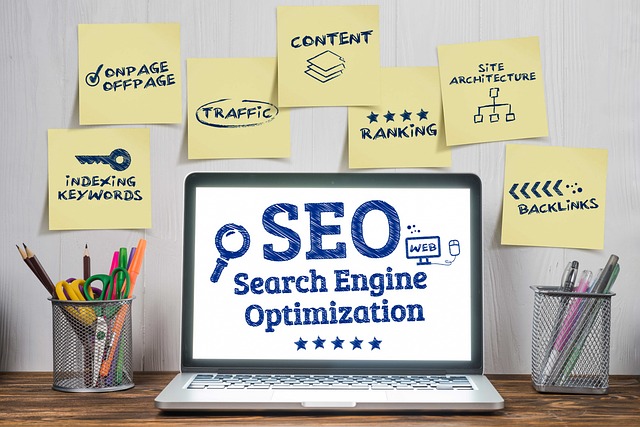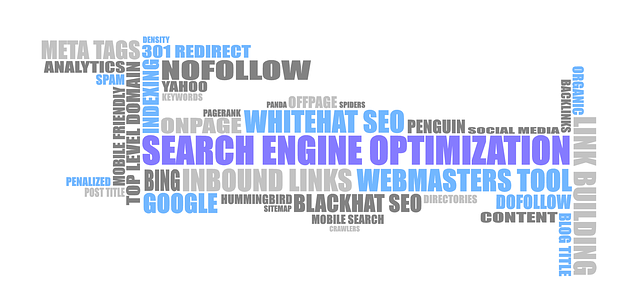Search Engine Optimization (SEO) is a powerful tool for businesses aiming for online success and increased conversions. By understanding user search intent through keyword research, optimizing website content, and integrating on-page and off-page techniques, companies can improve rankings, attract targeted traffic, and enhance user experiences. Effective SEO drives visibility, fosters trust, and encourages prospects to take desired actions, ultimately leading to higher conversion rates. Analytics tools are crucial for measuring success and refining strategies based on user behavior insights.
In today’s digital landscape, understanding the benefits of Search Engine Optimization (SEO) is crucial for any business aiming to boost online visibility and conversions. This article delves into the foundational concepts of SEO and its profound impact on customer acquisition. We explore key strategies, from keyword research to on-page optimization, to help you harness the power of SEO. By balancing on-page and off-page tactics, businesses can navigate the competitive online realm, increase their search rankings, and ultimately drive higher conversion rates.
Understanding Search Engine Optimization (SEO): The Foundation of Online Visibility

Search Engine Optimization (SEO) is a powerful strategy that forms the very foundation of online visibility and business growth. At its core, SEO involves understanding how search engines like Google work and what users search for. By optimizing websites and content to align with these factors, businesses can significantly enhance their online presence and reach their target audience more effectively.
The benefits of SEO are vast. It helps improve website rankings on search engine results pages (SERPs), making a brand more visible to potential customers. Well-optimized content also attracts organic traffic, which is cost-effective and highly targeted. Additionally, SEO fosters trust and credibility among users as it ensures that the provided information is relevant, valuable, and up-to-date, ultimately driving conversions and business success.
How SEO Impacts Conversion Rates: Unlocking Customer Potential

Search Engine Optimization (SEO) is a powerful tool that significantly influences conversion rates, unlocking immense customer potential for businesses. By optimizing websites for search engines, companies can attract a higher volume of relevant traffic, as SEO improves visibility and ranking in organic search results. Higher rankings mean more opportunities to capture the attention of prospective customers who are actively searching for products or services related to what you offer.
The benefits extend beyond increased website visits. Effective SEO strategies ensure that your target audience finds your content easily, resulting in improved user experience. Well-optimized pages load faster, are mobile-friendly, and provide valuable, relevant information, encouraging visitors to explore further and engage with the brand. This enhanced interaction increases the likelihood of conversions, whether it’s a sale, sign-up, or subscription, as satisfied users are more inclined to take desired actions.
Key Strategies to Optimize Your Website for Better Conversions

To maximize conversions, optimizing your website for search engines is crucial. Start by understanding your target audience and conducting thorough keyword research to identify terms they use when searching for products or services like yours. Integrate these keywords naturally into your web page content, meta titles, and descriptions to enhance your site’s visibility in search results. Additionally, ensure your website is mobile-friendly, as a significant portion of web traffic comes from smartphones.
Next, focus on creating high-quality, engaging content that provides value to visitors. Optimize images with alt tags, improve page loading speeds, and streamline navigation for a seamless user experience. Implement clear call-to-actions (CTAs) strategically throughout your site to guide visitors towards desired actions, such as making a purchase or signing up for a newsletter. Regularly updating content and earning backlinks from reputable sources can also boost your website’s authority and rank in search engines, driving more qualified traffic and increasing conversion rates.
The Role of Keyword Research in Enhancing SEO and Conversions

Keyword research is a cornerstone of successful Search Engine Optimization (SEO) strategies, offering numerous benefits that directly translate to increased conversions. By understanding user search intent and identifying high-volume, relevant keywords, businesses can optimize their online content to better align with what potential customers are actively searching for. This precise targeting ensures that website visitors are more likely to find the information or products they seek, leading to higher engagement and conversion rates.
Moreover, keyword research provides valuable insights into market trends, competitor strategies, and user demographics. Armed with this data, businesses can create content that not only ranks higher in search engine results but also resonates deeply with their target audience. This personalized approach enhances the overall user experience, fostering trust and encouraging visitors to take the desired actions, be it making a purchase, signing up for a newsletter, or requesting more information. Ultimately, effective keyword research is key to unlocking the full potential of SEO and driving significant conversions.
On-Page vs. Off-Page SEO: Balancing Act for Maximum Conversions

In the realm of Search Engine Optimization (SEO), a strategic balance between on-page and off-page techniques is essential to maximize conversions. On-page SEO involves optimizing individual web pages to rank higher in search engine results pages (SERPs). This includes refining content, meta tags, headings, and internal linking structures to align with user intent and search criteria. By enhancing on-page elements, you directly influence the relevance and visibility of your website, drawing organic traffic that is more likely to convert.
Off-page SEO, in contrast, focuses on building external authority and trust signals for your website. This involves earning backlinks from reputable sources, leveraging social media engagement, and engaging in content marketing strategies. While off-page efforts may not directly impact your page’s content, they contribute to your site’s overall credibility in the eyes of search engines. The harmonious integration of these two approaches amplifies the benefits of SEO, attracting a steady stream of qualified leads and ultimately driving conversions.
Measuring Success: Tracking SEO Performance and Conversion Data

Measuring success is an integral part of any digital marketing strategy, and SEO (Search Engine Optimization) is no exception. To understand the benefits of Search Engine Optimization, businesses must track their performance and conversion data. By utilizing analytics tools, marketers can gain valuable insights into how potential customers are finding their website, what content resonates with them, and ultimately, which strategies drive conversions.
Tracking key metrics such as organic traffic, keyword rankings, click-through rates (CTR), and bounce rate provides a comprehensive view of SEO effectiveness. For instance, a surge in organic traffic from targeted keywords can indicate successful optimization. Similarly, high CTRs on optimized content suggest that search engine results are attracting relevant visitors. Analyzing these data points allows businesses to refine their SEO strategies, optimize content, and ultimately, increase conversions by providing a better user experience aligned with their target audience’s needs.
